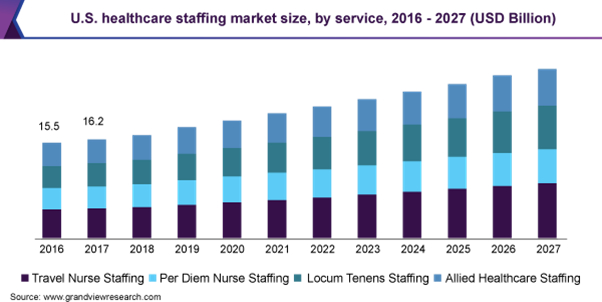Recent Posts
Most Popular
The Pros and Cons of Locum Tenens

A study by Grandview Research revealed that the global healthcare staffing market was valued at USD 31.8 billion in 2019 and is expected to register a CAGR of 5.4 percent from 2020 to 2027. With this, there is a gradual shift away from full-time specialists or hospitalist providers as physicians embrace the idea of locum tenens positions.
Locum Tenens means “to hold the place of'' and the term has been suitably used for physicians who provide clinical experience at different locations, or organizations through short-term assignments, primarily to fill the gaps in service left by caregivers who are traveling, have retired, or leave organizations. The added travel opportunities and flexible schedules are attracting both physicians and nurses, further boosting the market growth.
According to a Staff Care Survey, backed by the Joint Commission International between 2002 and 2016, the number of U.S. physicians working in locum tenens positions almost doubled, reaching 48,000, while 94 percent of healthcare organizations worked with contract physicians in 2016. These factors are anticipated to significantly boost the demand for healthcare staffing in the U.S.
The value of locum tenens staffing was demonstrated clearly during the 2020 COVID 19 pandemic. With the rising caseload, hospitals had to look at getting more clinicians on their workforce, either to serve the onslaught of COVID patients or to provide relief to their permanent staff.
The Pros of the Locum Tenens Route
Controlling the Calendar
Battling Burnout
Starting a Side Hustle
Ready for Retirement
But all that glitters is not gold! Here are a few aspects of locum tenens work that physicians should be wary of.
The Cons of Locum Tenens
Negotiating Terms and Conditions
Locum tenens physicians typically go through an agency or an intermediary to get assignments. Contract review, privileging and licensing, and malpractice insurance are all aspects that a locum tenens physician should be aware of before taking on assignments.
Minimizing the Cut
The staffing agency typically takes a cut to cover their administrative costs and locum tenens physicians should be aware of the value of their services, as well as what they end up with, in hand.
Building your Benefits
New Job, New Systems
Temporary work assignments can be frustrating as the processes and systems at various facilities will differ. There is a lack of stability and the learning curve is steep. Adapting to the social culture of the new environment is also a challenge. Many organizations won't pay attention to the advice or inputs of a locum tenens physician, knowing that they won't be around for very long.
With the 2020 COVID 19 pandemic, the popularity of the gig economy is spreading in healthcare, and the locum tenens path may end up becoming more mainstream. Locum tenens positions have a lot to offer to physicians, but they should go in with their eyes open, and ready to take on the challenges that come with these roles.
If you're interested in finding job opportunities through DocCafe, you can easily search and refine your results by selecting locums/travel as the "Position Type" filter. Additionally, if you require assistance with locum licensing and job placements, consider partnering with a specialized locum tenens agency.









Comments